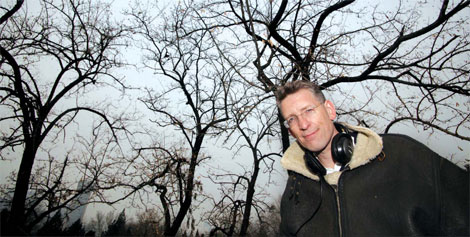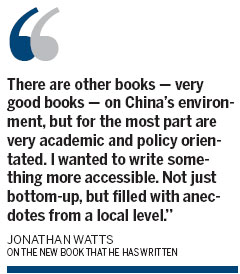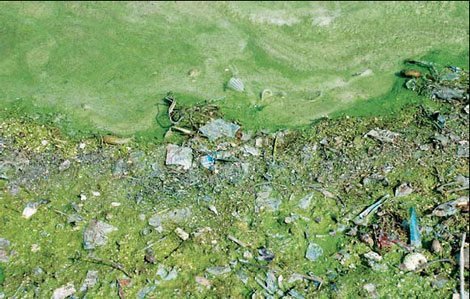
Correspondent for The Guardian says environmental travelogue best way to tell the story of China's development
Jonathan Watts is the Asia Environment Correspondent for the UK newspaper The Guardian and author of the environmental travelogue When a Billion Chinese Jump.
|
 UK journalist Jonathan Watts at the Ritan park in Chaoyang District. Wang Jing / China Daily
|
A tall, affable Brit, he asserts that he has had enough of being "earnest and gloomy and overly serious."
"My next book is going to be Hollywood Babes: The Inside Story, involving sunshine and the superficial," he joked.
"There are other books - very good books - on China's environment, but for the most part are very academic and policy orientated," he said. "I wanted to write something more accessible. Not just bottom-up, but filled with anecdotes from a local level."
His inspiration for the book comes from two of the biggest issues facing the world today - "the rise of China and the decline of the environment," he said. " It seemed a very natural thing to put the two together and to assess to what extent the two are related."
The path that led Watts to Asia, took him first to Japan as Watts was looking to dodge his student debt and turned to an English teaching job. "It was the peak of the Japanese bubble," Watts said. "So imagine you're a poor, slobby student with lots of secondhand clothes and you realize that there's a $50,000 a year job for essentially just sitting in a room with students." He added, jokingly: "many of whom are attractive young women."

But it was securing a job as a news assistant for a Japanese correspondent in London that was the real turning point for him. "I'd always been unsure about what I wanted to do, but like most 24 and 25 year-olds, I'd been interested in journalism. I got this chance and fell in love with it."
After a stint as a copy editor at the English language section of Japan's National Daily Newspaper, the Yomiyuri Shimbun, Watts began freelancing for The Guardian. His timing could not have been better, as soon the Asian Financial Crisis hit.
"One of the best things that ever happened to my career was the Asian Financial Crisis. There was a demand for stories and they (The Guardian) had just let their correspondent go."
However, after some high-profile coverage inside North Korea, Watts began to feel a little too settled into the rhythms of reporting on Japan.
"Things were going really well and it was the golden era, as far as money was concerned. But then you're asked to do another yakuza story...and of course you try and give it a new twist, but it does show in your writing."
Watts decided a career move to China in was in order. "In 2003, I got the job as China Correspondent for The Guardian and I really thought that I had the best job in the world. I was in an absolutely fascinating country at a fascinating time," he said.
The idea to produce a book had been on his mind since he left Japan, and to show the path of China's development, Watts' decided to write an environmental travelogue.
His journey begins in the underdeveloped region of Southwestern China, where the traditional sustainable lifestyles and Chinese view of nature are still evident. He then travels to Jiangsu to examine the impact of industrialization, followed by trips o Chongqing and Shanghai to explore the enthusiastic embracing of consumer culture.
His journey ends in North China where Watts looks at the main issues confronting the country, from overpopulation in Henan to carbon dependency in the coal mines of Shaanxi and Xinjiang.
"China is doing a lot more than people give it credit for," Watts insisted."The government's 11th Five-Year Plan included some really positive measures for setting a good targets for energy efficiency and pollution and long term targets for sustainable energy. In terms of renewable energy, China really seems to have embraced the idea of low-carbon growth perhaps more positively than Europe and the US."
The real problem, he said, is over-consumption, which is not simply a problem for China, but for the world.
"There's more and more of us in a finite world and we're encouraged to buy more and more things," he said. "Consumption doesn't have to be a bad thing, but one the thing missing is environmental consumer awareness."
|
 Algae, pollution and garbage in Dianchi Lake, Kunming city of Yunnan province. Jonathan Watts / For China Daily
|